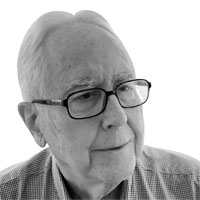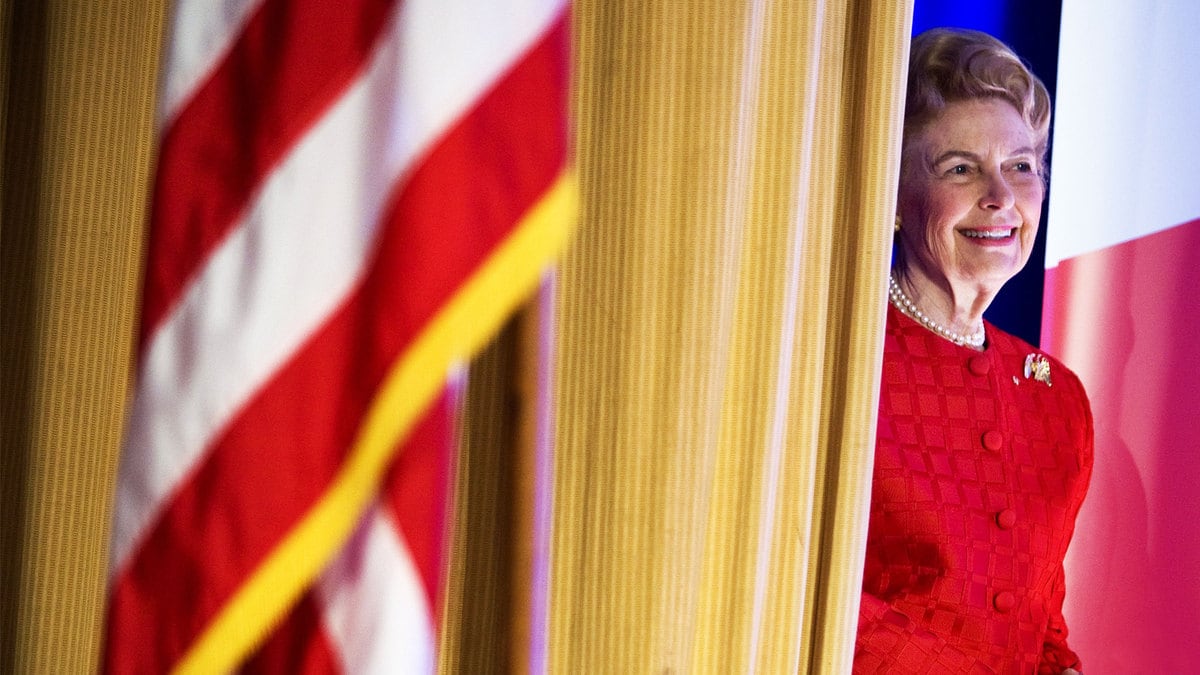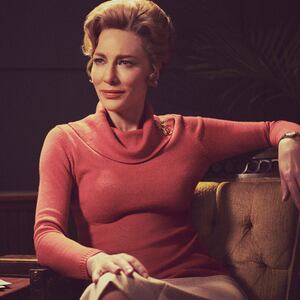Phyllis Schlafly was a secret member of the John Birch Society, the far-right group infamous for its support of segregation and its belief that a communist conspiracy had taken over the United States, according to documents newly obtained by researcher Ernie Lazar through FOIA requests.
Schlafly, who died in 2016, is most famous for her rear-guard fight that defeated the Equal Rights Amendment intended to guarantee legal gender equality for women and men after it had been approved in both the House and the Senate, backed by President Richard Nixon and ratified by 35 of the 38 states needed.
Throughout her life, Schlafly insisted she had never been part of the far-right group , as in a 1975 New York Times article that noted "Mrs. Schlafly's opponents have hinted in the past that her campaign was financed by money from the John Birch Society. She denies it, as well as, denying having ever belonged to the ultraconservative organization."
ADVERTISEMENT
Contradicting that claim was none other than the founder and chief of the Society, candy manufacturer Robert Welch, who referred to Schlafly as “a very loyal member of the Birch Society” in the February 1960 issue of the JBS Bulletin. But with Schlafly herself insisting otherwise, that could hardly be considered definitive.

"Stop ERA national Chairman Phyllis Schafly leads members opposed to the equal rights amendment in a song about the pro ERA forces plan for a national demonstration in the capitol city. The song stated \"You better look out, I'm telling you why, they're planning their trip, your votes to buy, Bella's bunch is coming to town.\" (Photo by Bettmann Archive/Getty Images)"
BettmannIn 1962, the JBS was the only group proposing that Barry Goldwater be the Republican candidate for president. That stance, and the group’s growing unpopularity with the public at large, led conservative opponents including American Enterprise Institute head William Baroody, philosopher Russel Kirk, and National Review editor William F. Buckley Jr., to meet in Palm Beach, Florida in January of 1964 to discuss the possibility of Goldwater running for president.
The purpose of the meeting, where they were eventually joined by Goldwater himself, was to discuss what the effect on the conservative movement would be if he ran and the JBS was one of his primary supporters. Kirk, as Buckley later wrote, said that Welch was “a man disconnected from reality.”
Goldwater was ready to denounce the Society’s support, but not to attack its members. He wrote to National Review that “Mr. Welch is only one man, and I do not believe his views, far removed from reality and common sense as they are, represent the feelings of most members of the John Birch Society.” In that manner, he tried to keep the support of its members while only repudiating the views of the JBS’ leader.
In the next issue of National Review, Buckley wrote a 5,000-word attack on Welch, who had declared in 1958 that “my firm belief that Dwight Eisenhower is a dedicated, conscious agent of the Communist conspiracy is based on an accumulation of detailed evidence so extensive and so palpable that it seems to me to put this conviction beyond any reasonable doubt.” Welch added that the government of the United States was “under operational control of the Communist party.”
Soon after, Buckley made NR off limits to Birch Society members who wanted to write for it, who from then on would be considered beyond the pale in mainstream conservative publications and organizations.
Hence, the dilemma facing Schlafly. As a major proponent of a Goldwater candidacy, and author of her own 1964 book favoring his run, A Choice, Not an Echo, Schlafly was now on the map as a principal figure who attacked the old GOP elite establishment and demanded that a true conservative and opponent of Communism become the party’s nominee and standard bearer. “Hundreds of thousands of copies were distributed in California before the crucial primary election and the national convention there,” The New York Times reported.
In 2016, Schlafly — whose fight against the ERA is now the subject of a new FX on Hulu docudrama, Mrs. America, starring Cate Blanchett — penned her final book, The Conservative Case for Trump. In it, she argued that he represented the resurgence of the populist and nationalist movement she had always supported, as “on issue after issue Donald Trump has said what we've been told is the unsayable.”

Yet Schlafly denied to the end that she ever was a JBS member. I speculate that because it was because the group was so widely mocked and reviled — including in the Bob Dylan song Talkin’ John Birch Paranoid Blues and The John Birch Society by the Chad Mitchell Trio, then featuring John Denver, both issued in 1962 — that she feared the association would have damaged first Goldwater and then her anti-ERA campaign. After that, perhaps it was too late for her to admit the deception now fully exposed by the new documents shared by Lazar.
In the first of those, Schlafly wrote a letter on her personal stationary to Verne Kaub, head of the American Council of Christian Laymen in Madison, Wisconsin. She would be happy, she wrote on December 5, 1959, “to send you the list of persons who attended Bob Welch’s meeting.” She then added: “The John Birch Society is doing a (sic) wonderful work, and my husband and I both joined promptly after the Chicago meeting.”
On August 19, 1964, Welch wrote a five-page letter addressed to Mrs. Tom Anderson, rather than by her own name Carolyn. The letter concerned books that the Society was pushing that would impugn Lyndon B. Johnson and praise Barry Goldwater. Welch was concerned that some JBS members had “made some brief rumblings” about their discontent that the Society was discouraging any “mass exploitation of Phyllis Schlafly’s A CHOICE NOT AN ECHO by The American Opinion Library in Nashville.” They took this course, he said, at “the request of Schlafly herself.” Despite some disagreement with her over one or two issues he did not specify, Welch wrote that her book was “excellent, and was going to be very helpful in the [Goldwater] campaign.”
Nevertheless, he noted that some top campaign officials were “extremely fearful” that the book’s influence could be harmed “if they could tie it in any way to the John Birch Society, and that any such development might actually damage rather than help the total Goldwater cause.”
Next, Welch presented the bombshell. “Phyllis even resigned from the Society,” he wrote, “when she brought the book out, in order to avoid this possibility.” And with her “full knowledge and even appreciation,” Welch continued, “her book was never mentioned in the Bulletin of the Society nor even in American Opinion,” the Society’s magazine. Welch took care never to have her books shipped to them in bulk, or carried it in their wholesale department.
Nonetheless, 300,000 books were distributed in California by the Society, ahead of the state’s primary and the party’s convention there that year. They were careful not to distribute them through Society bookstores “to any sufficient extent as to give the enemy a lever with which to raise the storm and smear that they would have liked to bring about.”
So much for her resignation, let alone her denial that she’d ever been a member.
Meantime, the ideas of the John Birch Society flourished even as the group itself largely faded from view, so that Buckley, who’d led the conservative purge of it, commented in the March 2008 issue of Commentary that “Barry Goldwater did not win the presidency, but he clarified the proper place of anti-Communism on the Right, with bright prospects to follow.”

Today, the conspiratorial mindset of the JBS lives on in the MAGA movement cheered on by the Society itself, which is still limping along.
In a December 2016 interview in American Opinion, new CEO Arthur R. Thompson said the goal of the John Birch Society remains the same as it was at its creation: fighting “an agenda by those who wish to rule the American people that has never changed from its basic ideas of changing our American society on the road to building socialism. This agenda has been used by every despot since history has been recorded, with a few nuances altered due to the growth of technology. We are dealing with human nature, which never changes.”
Thompson said the Society's job now is to keep Trump honest, noting that most of his campaign issues “were issues that our Society pioneered…when no other organization would touch them.” Trump’s movement, he boasted, “was created by the members of the John Birch Society, directly or indirectly.”







